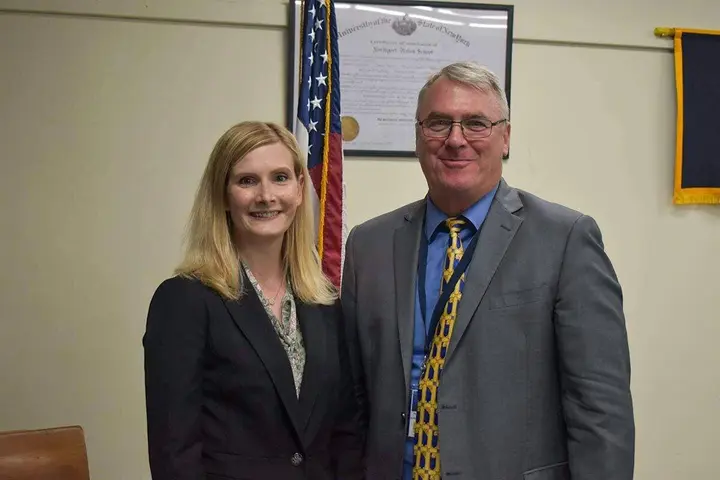An in-depth look at Riana DiPalma, Northport-East Northport’s new English department chairperson

Earlier this month, the Northport-East Northport School District welcomed its new Chairperson of English Language Arts and Library K-12, Riana DiPalma. She replaces former Chairperson Dr. Patricia Schmitt, who retired at the conclusion of the 2020-2021 school year after 19 years with the district.
Ms. DiPalma’s resume is far from sparse: she holds a Bachelor’s in Theatre and English from Northwestern University, a Master of Arts degree in Educational Theatre and Secondary English Education from New York University, and a Master of Education degree from Columbia University. She’s been an assistant principal at Port Richmond High School on Staten Island since 2013, and worked in the Brooklyn School for Music and Theatre in both educational and administrative positions for eight years before that.
“Her impressive background and passion for the subject area stood out amongst many applicants, and we are thrilled to have her join us next year,” said Superintendent of Schools Robert Banzer.
In an interview with the Journal, Ms. DiPalma spoke about her new position and unique approach to English education. A theatre lover, she found herself drawn to how literature explores humanity; she knows that it can be used as a vehicle to learn more about the world and oneself.
“Theatre was my passion,” she said. “I thought I was going to be an actress… As I went through college, I started taking creative drama and theatre education classes. I said, ‘This is really interesting.’”
So interesting, Ms. DiPalma said, that she decided to go to NYU to pursue Educational Theatre. She graduated in 2005, then became a theatre and English teacher at the Brooklyn School for Music and Theater, a performing arts high school in Brooklyn.
As an educator, Ms. DiPalma stressed the interdisciplinary nature of the theatre, using the stage at various times in her classroom “to reflect the goings-on of the time period,” she said. Citing Shakespeare – whose work lands in both theatre and English departments – Ms. DiPalma expressed her deep love of the Bard both in the classroom and on the stage: “I think Shakespeare, as much as some people see it as antiquated, is really a great tool for teaching analysis. You really have to look at language very deeply to understand what he is saying.”
Along with academic pursuits, theatre also helps the student grow and engage with life, Ms. DiPalma said. “Theatre is everything. It gives students confidence,” she said. “Myself, I was a reserved and quiet kid, but I felt a love in the theatre, and that was the place where I felt the most myself. It’s a place where people can come into their own. It’s a great place for students to really learn about themselves.”
With a rise in interest for STEM (Science, Technology, Engineering and Mathematics) subjects, Ms. DiPalma knows that supporting student interest in the humanities is an important aspect of her position.
“I think [the humanities] are in decline because we see where the world is going. People are seeing the studies of literature and history as things of the past. We have to change the way that these subjects are taught,” she said. “Teachers used to be the keepers of all information. Now, it’s not about giving information – anything a student wants to find they can look up – it’s about teaching students how to utilize the information. That’s where we need to go in the humanities: giving students a sense of all that is out there, and the ways in which they can integrate that into their knowledge of the world.”
To Ms. DiPalma, English is about discovering the humanity within yourself and exploring the way you fit into the world. “Great writers write about what is going on in the world, and the way that human beings connect or disconnect from life. There’s a lot to be said about utilizing those as lessons for dealing with day-to-day strife,” she said.
Beyond lessons of grammar and proper essay formatting, Ms. DiPalma believes English is a place to think about who you are as a person. “English teaches you how to think,” she said. “Being able to analyze text is a skill that you are going to use in any field, whether it’s literature or informational.”
When asked to describe her educational philosophy, she said, “The answer is in the room. As educators, we don’t work in bubbles. We have to really connect with those around us. Almost every activity I gave students would give them a chance to engage in discussion and work with groups of students. I always say the person who is learning is the person who is talking.” She said she considers both components of literary education important: content (what is written) and form (how it is written).
So what work would Ms. DiPalma choose, if she could assign just one piece of literature to every high school student in America, and why?
Shakespeare’s Hamlet, she said.
The seventeenth-century tragedy is unanimously commended by critics, with thousands of books, essays, and doctoral theses written on the matter.
“Hamlet happens to be great for students because it’s about a teenager who is battling everything: he’s battling issues with his parents, battling issues with his girlfriend, battling the meaning of life, and the meaning of death. There’s just so many things to discuss within that work,” Ms. DiPalma said.
Don’t miss a story
Get the latest news delivered to your inbox.








